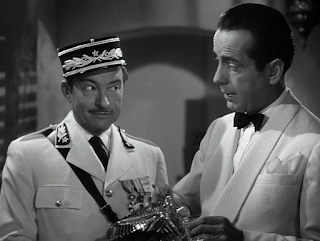 Before watching I basically only knew this film as the one that stopped It's A Wonderful Life from winning. (Although whether or not George Bailey and co ever stood a chance against the other three nominees is debatable - it only became a classic through TV syndication much later).
Before watching I basically only knew this film as the one that stopped It's A Wonderful Life from winning. (Although whether or not George Bailey and co ever stood a chance against the other three nominees is debatable - it only became a classic through TV syndication much later).I knew the basic plot - servicemen return from the war and face heartwarming struggles in small town America. I also knew that one of them had hooks instead of hands, was played by a real serviceman with a real disability and that this was also a heartwarming struggle in itself. And I knew that it was filmed immediately after the end of the war.
Forgive me for being cynical (for the third time in as many films) but the whole thing sounded as though it was going to be patriotic slush. And I wasn't sure how much I'd enjoy sitting through nearly three hours of it.
Again (for the second year running this time) I hadn't really clocked on to who the Director was. William Wyler saw Mrs Miniver and co into the war in expert fashion - could he manage to see the residents of Boone City out at the other end in similarly impressive style?
The Ceremony:
Jack Benny presented again this year - at the Shrine Auditorium on March 13th 1947.
I can't find a great deal of information about the ceremony this time - although I imagine it was similarly glitzy to the previous year.
The nominations were streamlined this year, with no category having more than five nominations. This practice continued for several decades.
Other Notable Winners That Night:
 |
| Fab photo - one Oscar for each prosthetic! |
The Actress awards went elsewhere - to Olivia de Havilland (still with us aged 101 at time of writing!) and Anne Baxter (who we'll be hearing "all about" in a few years time....)
Tom and Jerry won again, with a cartoon that is often voted as one of the greatest ever made. I have very strong memories of this one from my childhood and it was lovely watching it again when I found it on Youtube:
Best Song:
I love this one - On The Atchison, Topeka and the Santa Fe from The Harvey Girls. The film is in glorious Technicolor and the whole number is about nine fabulous minutes, but the only clip I can bring you is three minutes in black and white.....which is better than nothing.
 |
| George Bailey - I'll love this film til the day I die! |
The other three nominees are less classic - Henry V (which will get recognition of sorts two years later), The Yearling (more post-war sentiment) and The Razor's Edge (one I've not seen, but it sounds interesting - though possibly as dark and brooding as last year's winner so not a contender).
Not on the list, but still worth a mention is another personal favourite, Brief Encounter. It had three nominations (including Director and Actress) but not one for Best Picture. Which is a shame.
It's A Wonderful Life could have probably given some of the earlier winners of the 40s a run for their money, but something more specifically post-war and hard-hitting was always going to win out. And I can't begrudge Best Years Of Our Lives for that!
Our Verdict:
 |
| One of each - both in terms of the force they were in and the economic circumstance they come back to. |
However, pretty much literally at that point, things start to change. From the moment they are reunited with their families I was sucked into all three intertwining stories.
 |
| No hands - no CGI |
 |
| The Stephensons - not unlike the Minivers. |
Probably the saddest and most dramatic story is that of airman Fred (surprisingly the only one of the three roles not to be Oscar nominated). He has clearly loved his time in the war and has been honoured several times for his efforts as a master bomber. But it turns out that he is from a much poorer family than the others and has no qualifications and (because bombers aren't needed any more) no skills or experience. He also has a young wife who he hardly knows and who appears to have married the uniform not the man. And he's suffering from what we would now call PTSD.
 |
| Reunion at Uncle Butch's |

































